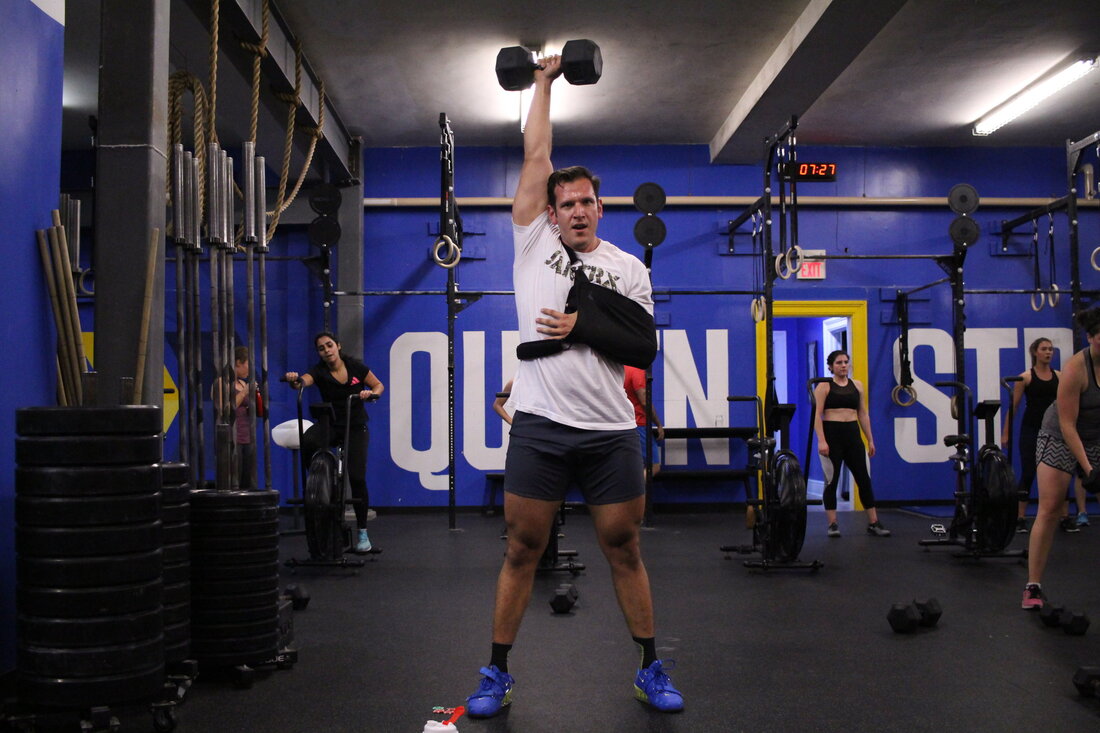|
No matter the severity or duration, each injury is challenging in its own way. We have to realise that there are stages to the injury process that are much like the stages of grief we go through when a loved one dies. We also have to realise that the faster we can work through those stages, the better off we will be mentally, physically and emotionally. Here are the stages as well as commentary on their effects. Denial When the injury first occurs, often a lot of endorphins and adrenaline are in our body as a result of the activity we are performing. Whether from playing a game, running a race or working out in the box, the pain of an injury is often dulled initially due to those chemicals within your body. Mentally, you want to finish what you started. There is a tendency, even though you know better, to push on and continue to do the activity. Obviously, this can have detrimental effects, worsening the injury and making for a longer recovery. When we are young, we are prone to trying to play through the pain and continue on. This often leads to making things worse or injuring another part of our bodies as we try to compensate for the original injury. It is difficult, but you have to make yourself stop the activity once you realize that the injury is more than just immediate or superficial pain. The sooner you stop or adjust what you’re doing, the better off your body will be. Anger Once you realize the presence of true pain you can’t work through or that will in some way inhibit you, anger sets in—anger at yourself for doing whatever caused the injury or anger at your body for being injured and not being able to do what you want it to do. Anger ultimately does nothing to help you recover. It does no good to dwell on the injury or replay it in your mind and try to will a different outcome. It happened, and you can’t go back in time to change it. Depression This is one of the most dangerous stages because it’s one where you can easily get stuck for a long time. Realizing you can’t do what you want and seeing others who are still able can certainly make you feel sorry for yourself. You feel useless and worthless, especially when compared to how you feel when you are able to work out and push through to new accomplishments. You start to worry that all you have done will be for nothing as you lie idle and try to recover. This can be a very helpless feeling. If you don’t get out of this stage, it can be extremely detrimental. It can affect your relationships with significant others as you push them away. It can make you overeat. It can make you more likely to do nothing to help yourself because you are convinced you can’t do anything. Depression can snowball into a long period of time from which it is much more difficult to recover. Most injuries are temporary. You have to realize that rest equals recovery. Give it appropriate time, keep upbeat, accept the support of others, stop feeling sorry for yourself and you will get through it sooner. Bargaining Bargaining comes into play as you start to get back to work. It’s easy to feel like this: “If I just push myself a little harder, or do a little more, I’ll get back to full strength sooner.” You have to realize that this isn’t always the case. Pushing too hard or too soon can cause re-injury. You have to listen to your body. Do what you can do. Push yourself a little but listen to your body—especially the injured part—and stop or adjust what you’re doing if it hurts too much. Acceptance and Determination The more quickly you can get to this stage, the better off you will be. By accepting the fact that you are injured, convincing yourself that rest is a good thing, accepting the limitations of the injury, and being determined to do what you can and get back to form, you can now develop a plan to get back to action. Depending on the injury, you may not be the same as you were prior, but you can get back and do something to keep yourself in good mental and physical health. Some of us have had many injuries throughout the years, whether playing sports, training for triathlons or now with CrossFit. Along the way, we have been stalled at many of these stages, much to our detriment. If we are aware and process the stages above we will have the ability to get through these stages more quickly, although they are all still there. It is a mental battle all the time, but it will be to our great benefit to win and win quickly. Article by CrossFit, LLC 2012
0 Comments
Leave a Reply. |
AuthorCrossFit Pretoria Archives
April 2023
Categories
All
|


 RSS Feed
RSS Feed
